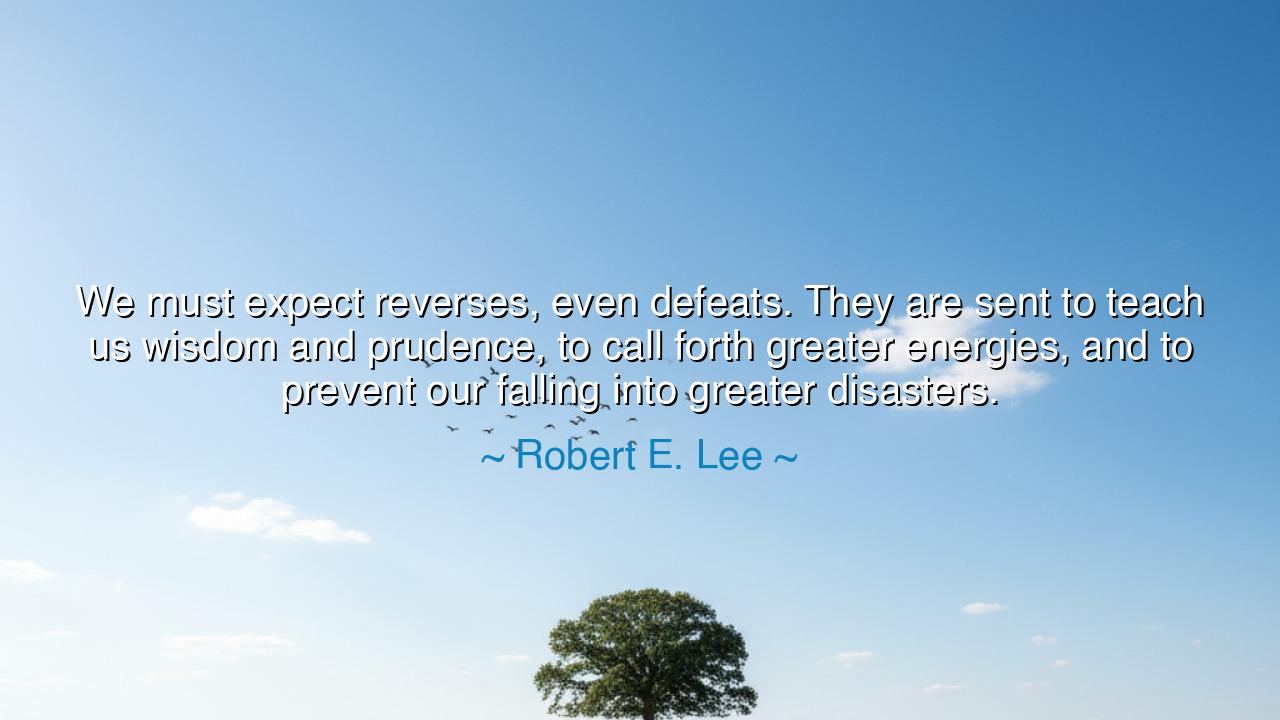
We must expect reverses, even defeats. They are sent to teach us
We must expect reverses, even defeats. They are sent to teach us wisdom and prudence, to call forth greater energies, and to prevent our falling into greater disasters.






The soldier and commander Robert E. Lee, who bore both triumph and ruin in the furnace of war, once declared: “We must expect reverses, even defeats. They are sent to teach us wisdom and prudence, to call forth greater energies, and to prevent our falling into greater disasters.” In these words he speaks not merely as a general but as a philosopher of struggle, teaching that defeat is not the end, but a stern tutor sent by Providence. For when men stumble, they may rise sharper, stronger, and wiser, if only they do not lose heart.
The origin of this truth lies in Lee’s experience leading armies during the American Civil War. He knew both the glory of victory and the bitterness of loss. He saw how unexpected reverses forced commanders to think with more prudence, to summon hidden reserves of energy, and to avoid recklessness that could lead to even greater ruin. From the crucible of his own trials, he forged this teaching: that hardship is not punishment, but discipline—sent to prepare the soul for endurance and growth.
History echoes with the same lesson in the life of Abraham Lincoln. Before becoming America’s revered president, Lincoln faced business failures, electoral defeats, and deep personal sorrow. Each reverse, rather than breaking him, tempered him, teaching him wisdom and fortifying his spirit for the greater trials of civil war. Without these earlier defeats, his leadership might have lacked the strength to bear the weight of the nation’s suffering. Thus, Lee’s words find truth even in his adversary’s life: defeat can shape greatness.
The ancients too proclaimed this mystery. The Greeks sang of Odysseus, tossed from ruin to ruin across the seas. Every shipwreck, every captivity, every reverse taught him cunning, endurance, and strength, until at last he returned to Ithaca not only as a warrior but as a man of deep prudence. So too, the Hebrews told of Joseph, who fell into slavery and prison before rising to rule Egypt—his defeats becoming the path to deliverance.
Therefore, O seekers, do not despise defeat, nor curse the days of hardship. They are the fires that temper the steel of the soul, the storms that teach the sailor, the blows that awaken hidden energies within. Reverses may wound, but they also protect—steering us from greater ruin, guiding us toward deeper wisdom. Walk boldly, then, into the trials of life, knowing that every loss is a lesson, and every fall, if borne with courage, is a step toward enduring strength.






VNVanthu Nguyen
I find this quote really thought-provoking, especially because it places a positive spin on failure. It suggests that setbacks are necessary to build wisdom and prevent even worse outcomes. But can we always view failures this way? Or is it harder to maintain that mindset when the stakes are high? How do we learn to be more patient and trusting in the process of learning through adversity?
UGUser Google
Robert E. Lee’s perspective is a reminder that success isn’t linear. This quote feels almost comforting, because it tells us that it’s okay to fail. Defeat doesn’t mean the end, but rather an opportunity to recalibrate and gather more strength. But is it really possible to see the wisdom in defeat when you’re in the midst of it? How do we keep a sense of hope and learning in the face of failure?
NAngoc anh
This quote really challenges the way we often view failure. It’s easy to get discouraged when things don’t go as planned, but Lee suggests that defeats have a deeper purpose—to teach us wisdom and prevent bigger disasters. I wonder if this is something we can apply in every aspect of life, or is it more relevant to major challenges like war or personal crises? How do we take this mindset and apply it to smaller, everyday struggles?
Hhuukhjdhdjgjv
Robert E. Lee’s quote really speaks to the importance of resilience. It suggests that defeats are not only inevitable but also necessary for growth. It’s interesting because we tend to fear failure so much, yet it seems like it’s often through setbacks that we learn the most. Do you think setbacks truly build character, or can they also break people down? How do we learn to embrace defeat as a tool for growth instead of seeing it as purely negative?